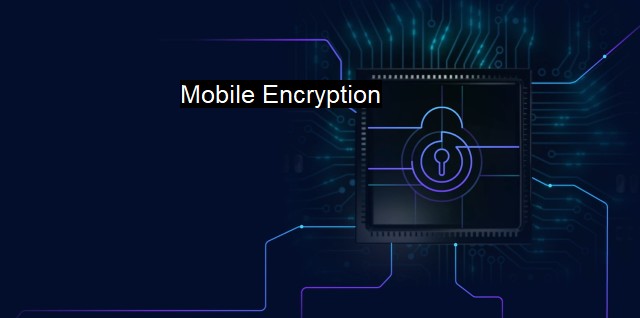What is Mobile Encryption?
Fortify Your Mobile Privacy: Exploring the Importance of Mobile Encryption and Its Benefits for Cybersecurity
Mobile encryption refers to the protective measures taken to safeguard data stored on mobile devices or transmitted through them. In the realm of cybersecurity and antivirus systems, this is a significant strategy to secure individuals’ and organizations’ sensitive data from unauthorized eyes intending to exploit them for wrongful acts.Encryption can be defined as the active process of turning data into cipher-text, a form of data that appears to be gibberish unless decrypted with a specific key. This decryption key is generated during the encryption process. It is unique to each set of data, which enables only authorized entities to access, read, and utilize the given data.
Mobile encryption can be categorized into two primary sorts: device encryption and communication encryption. Device encryption uses disk or full-disk encryption to protect the device's internal storage. It offers an encryption layer for the entire system, meaning any saved files, app data, and even log-in credentials are encrypted. When dealing with device encryption, once a mobile device is locked or rebooted, it cannot be accessed without the proper decryption key.
On the other hand, communication encryption works to secure data transmission. We often share numerous vital pieces of information, such as bank details, personal media, etc., while sending files or texts. So, encryption comes into play during this transmission, making such data exchange confidential and secure.
Now one might ask, why is mobile encryption important? To answer that, think about the pivotal role smartphones and tablets play in our daily lives. They hold a massive amount of sensitive information – from personal photos and messages to vital business emails or access to bank accounts. With cyber-attacks rising around the world, the exposure of this kind of data can spell disaster, making encryption a crucial shield.
Mobile devices unwittingly offer an ideal backdoor to cybercriminals. Phishing attacks engineered for mobile, specifically, have massively raised in recent years. Hackers employ a wide variety of tactics, from scareware (which makes users believe their device is infected when it’s not) to ransomware (which holds data or device functionality to ransom) to exploit vulnerabilities.
This is where stringent encryption becomes the prime line of resistance. Effective mobile encryption entails that even if a device falls into the wrong hands or is infected by malware, the data contained within will remain inaccessible and, therefore, useless to those who have purloined it. An attacker will gain no valuable data rendering even the most successful attack a redundant move.
Alongside the security benefits, an encrypted device ensures compliance with data privacy regulations stated by bodies like GDPR and others. Various industries such as healthcare, e-commerce, financial institutions, etc., employ data encryption to comply with such obligatory regulations to secure user's private data.
Mobile encryption plays a vital role in our tech-driven era, where crimes like Identity Theft, scams, and other cyber threats exist alongside the significant advances of the digital age. While it cannot single-handedly stop cybercrime, it can indeed serve as an outstanding deterrent. For individuals and organizations alike, it's one of the most robust defenses to preserve the confidentiality and integrity of sensitive data on mobile devices. On a larger scale, the significance of mobile encryption rests in its capacity to not only safeguard user data, but also defend against manipulative cyber activities aimed at disrupting our increasingly interconnected global world.

Mobile Encryption FAQs
What is mobile encryption?
Mobile encryption is the process of securing data on a mobile device by converting it into a code that can only be deciphered with a key or password. This helps to protect sensitive information on the device from potential hackers or cybercriminals.Why is mobile encryption important for cybersecurity?
Mobile encryption is crucial for cybersecurity because it helps to prevent unauthorized access to sensitive data on mobile devices. Without encryption, hackers or cybercriminals could potentially gain access to personal or confidential information stored on a device, which could be disastrous for individuals or businesses.How does mobile encryption differ from antivirus software?
Mobile encryption and antivirus software serve two different purposes. Encryption is focused on securing data on a device by converting it into a code that cannot be read without authorization, while antivirus software is focused on identifying and removing malicious software that could compromise a device's security. Both are important for cybersecurity and should be used in conjunction with one another.What are some best practices for mobile encryption?
Some best practices for mobile encryption include using strong passwords, encrypting data at rest and in transit, updating software regularly, and avoiding connecting to insecure public Wi-Fi networks. It is also important to use reputable encryption software and to ensure that all devices are properly secured and protected against potential threats.| | A | | | B | | | C | | | D | | | E | | | F | | | G | | | H | | | I | | | J | | | K | | | L | | | M | |
| | N | | | O | | | P | | | Q | | | R | | | S | | | T | | | U | | | V | | | W | | | X | | | Y | | | Z | |
| | 1 | | | 2 | | | 3 | | | 4 | | | 7 | | | 8 | | |||||||